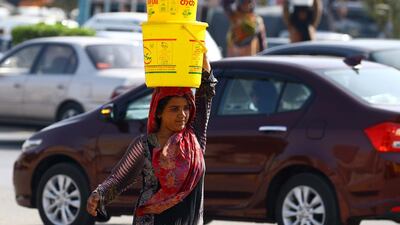Germany industrial giant Siemens is looking to expand in Pakistan as the South Asian country switches from coal- to gas-fired power stations, on the back of cheap LNG prices.
"There are other opportunities, other power plants under discussion still in a development phase …in Punjab and other areas," Gianluigi Di Giovanni, senior executive vice president, Siemens Power Generation Services - Middle East said in an interview with The National.
"The most important thing is to have a power purchase agreement with the government in the area. We have seen a couple of projects in the pipeline,”he added.
Pakistan, the world’s sixth-largest country by population has been plagued with incessant power cuts with a gap between demand and supply estimated at around 5,000MW to 7,000MW. The shortfalls lead to outages, commonly known as “load shedding” which the government said it had put an end to by the end of last year as it green-lighted projects to meet the country’s power requirements in entirety by 2030.
One such project to have received the government’s nod is the 1.3GW combined-cycle plant in Punjab - the country’s second largest province by population. Siemens signed a long-term service agreement with provincial state utilities firm Punjab Thermal Power (Private) Limited “to provide comprehensive maintenance, parts and repair services for Punjab Power Plant Jhang for the next 12 years,” the company said last week.
_____________
Read more:
Iraq could save $5.2bn in four years from flared gas reduction, says Siemens
Exclusive: Siemens expects uptick in growth of regional business on back on Iraq energy needs
_____________
The project, which uses Siemens’ larger capacity turbines would be one of the country’s largest gas-fired combined cycle projects.
Much of the recent uptick in power investment, which lagged for years in Pakistan can be put down to the country’s recent successful scouring of cheap long-term liquefied natural gas contracts. The government inked a 15-year agreement with Qatar in 2015 to import up to 3.75 million tonnes of LNG annually. Pakistan is also said to be in talks with Russia and Malaysia to finalise more such government-to-government contracts as it moves away from spot purchases of the cleaner fuel, which it finds less competitive.
Pakistan has begun preparations for importing more gas, with a second LNG terminal inaugurated last year at Port Qasim in the country’s commercial hub of Karachi.
Despite its moves to enlarge the share of gas in the power grid, the Pakistani government, has also invited criticism for okaying around $15bn worth of investments in coal-fired power plants of different sizes to be built over the next 15 years by Chinese companies.
China is one of Pakistan’s biggest foreign investors and is currently engaged in developing the $54bn China Pakistan Economic Corridor, as part of its Belt and Road policy. Of the committed investments in its close regional military ally, China is expected to spend around $33bn alone on 19 energy projects, which includes coal-fired and renewable power plants along with related utilities infrastructure.
The government hopes to deploy around 16GW of power generation capacity from the Chinese energy investments, which is expected to plug power deficiencies.
The government is also currently working on a major shift in its energy policy to develop a “take and pay” power purchase agreement with private companies.
Power inefficiencies in energy resource-scarce Pakistan and neighbouring India, Asia’s third-biggest economy have dragged growth, putting brakes on planned economic development plans.
Islamabad’s challenges with power generation can be underlined by the fact that despite government’s declared end to load shedding end of last year, Friday’s Pakistan Day celebrations saw widespread outages, sparking outrage among residents in Karachi and suburbs.


